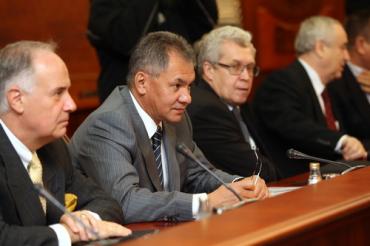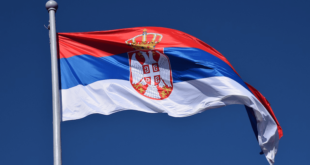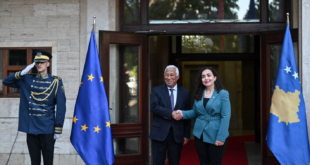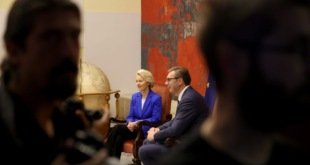 Serbian PM Mirko Cvetković met on Monday in Belgrade with Russian Emergency Situations Minister Sergei Shoigu.
Serbian PM Mirko Cvetković met on Monday in Belgrade with Russian Emergency Situations Minister Sergei Shoigu.
Cvetković was quoted as telling his guest that the visit of Russian President Dmitry Medvedev on Tuesday is extremely important for boosting the overall bilateral relations.
The premier assessed that Serbia and Russia have a long tradition of successful and close relations, the government’s press service released in a statement.
At the meeting, it was pointed out that Serbia “was fully committed to a further development of all-encompassing cooperation with Russia, as one of its strategic partners”.
Concrete projects in the field of economic cooperation were also discussed, and the collocutors pointed out the importance of the realization of the NIS projects – the construction of the South Stream gas pipeline and Banatski Dvor gas storage facilities, the statement said.
Cvetković and Shoigu agreed that the two countries still have room for improving their cooperation not only in the field of energy, but also in the trade, transportation, military- technical, and cultural and scientific sectors.
Cvetković thanked Russia once again for the country’s principled position and the efforts the it was making in defending the principles of international law in the context of Kosovo and Metohija and the preservation of Serbia’s territorial integrity and sovereignty.
Shoigu, who is also chairman of the Russian part of the inter-governmental Serbian-Russian Committee for Trade, Economic, Scientific and Technical Cooperation on Monday expressed his satisfaction with the finalization of the projects agreed at the last session of the joint committee.
During his meeting with Serbian First Deputy Prime Minister and Interior Minister Ivica Dačić, Shoigu said that the fact that all major projects, agreed at the last session of the Russian-Serbian committee in Moscow were finalized is of great importance for the relations between the two states, the Serbian Ministry of the Interior (MUP) said in a statement.
The Russian minister was also quoted as saying that those projects include sale of Serbia’s formerly state-owned oil company NIS, realization of all necessary formal and legal activities for the setting up of joint-venture companies Južni Tok (South Stream) and Banatski Dvor, as well as the works on expansion of the capacity of the Banatski Dvor gas storage and its modernization.
Shoigu underscored that “significant progress in the relations between the Republic of Serbia and Russian Federation had been made since Dačić and himself took over the chairmanship of the Committee”, the statement read.
Shoigu’s visit to Serbia comes one day ahead of the arrival of President Dmitry Medvedev.
In an interview with daily Danas, Shoigu said that cooperation between Serbia and Russia will head in many directions, such as development of transportation infrastructure, “but also the possible arrival of the Gazprombank in Serbia and an extended list of products from Serbia that can be exported to Russia without customs duty.”
The Russian minister also stated that Moscow wants to see Serbia, through full-fledged participation in the South Stream natural gas pipeline project, become a key energy source in the Balkans, an important part of the European market for the transit of gas and a center for storage as well.
He said that he hopes that the realization of these agreement will begin soon, “all the more so since the issue of a Russian loan to Serbia, which is also key to the realization of infrastructure projects, is practically a done deal”.
Shoigu added that the loan arrangement – according to earlier announcements expected to be worth USD 1bn – “will be official soon”.
The minister concluded by saying that “concrete financial conditions have been left to the finance ministries of both countries and a group of experts”.
 Eurasia Press & News
Eurasia Press & News



